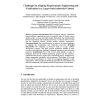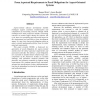156 search results - page 14 / 32 » Requirements Traceability |
PLDI
2010
ACM
14 years 4 months ago
2010
ACM
Self-adjusting computation provides an evaluation model where computations can respond automatically to modifications to their data by using a mechanism for propagating modifica...
RE
1999
Springer
14 years 3 months ago
1999
Springer
Multiple viewpoints are often used in Requirements Engineering to facilitate traceability to stakeholders, to structure the requirements process, and to provide richer modelling b...
REFSQ
2010
Springer
2010
Springer
Challenges in Aligning Requirements Engineering and Verification in a Large-Scale Industrial Context
13 years 8 months ago
[Context and motivation] When developing software, coordination between different organizational units is essential in order to develop a good quality product, on time and within b...
RE
2004
Springer
14 years 4 months ago
2004
Springer
Aspect-oriented software development (AOSD) techniques support systematic modularization and composition of crosscutting concerns. Though AOSD techniques have been proposed to han...
ESEM
2010
ACM
13 years 11 months ago
2010
ACM
Though very important in software engineering, linking artifacts of the same type (clone detection) or of different types (traceability recovery) is extremely tedious, error-prone...


